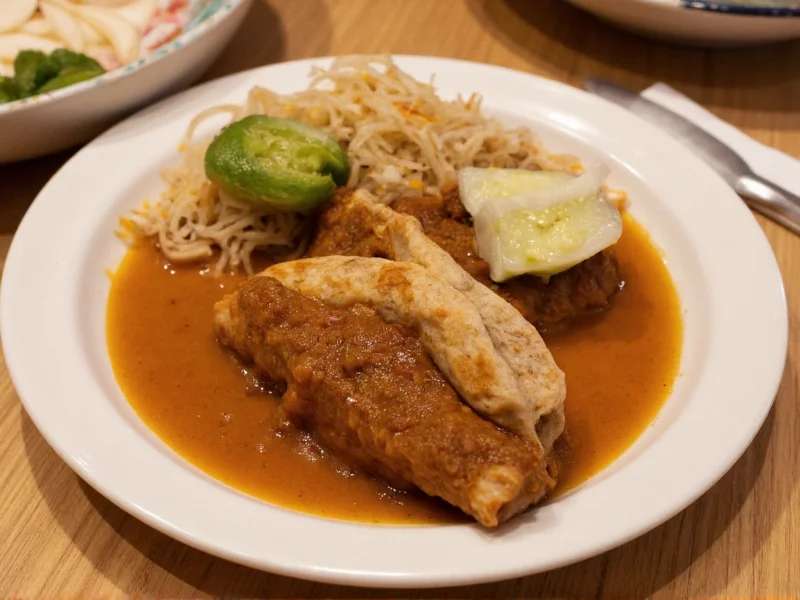A mole burrito represents a delicious fusion of two iconic Mexican culinary traditions: the handheld convenience of a burrito and the sophisticated complexity of mole sauce. Unlike standard burritos that typically use simpler salsas or sauces, the mole burrito stands out through its signature sauce, which requires careful preparation and balancing of numerous ingredients.
The Origins of Mole Sauce
Mole (pronounced "moh-lay") has deep roots in Mexican culinary history, with origins tracing back to pre-Hispanic times though the version most commonly associated with mole burritos evolved after the Spanish colonization introduced new ingredients. The word "mole" comes from the Nahuatl word "mōlli," meaning sauce or concoction. Authentic mole sauce traditionally contains between 20-30 ingredients, varying by region and family recipe.
While many people mistakenly believe chocolate is the dominant flavor in mole, it actually plays a subtle supporting role, providing depth and complexity rather than sweetness. The foundation of genuine mole consists of multiple varieties of dried chilies—including ancho, pasilla, and mulato—which create the sauce's characteristic earthy, smoky base.
Key Components of an Authentic Mole Burrito
Understanding what makes a mole burrito special requires examining its essential elements:
| Component | Traditional Ingredients | Modern Variations |
|---|---|---|
| Mole Sauce | Dried chilies, spices, nuts, seeds,少量 chocolate, broth | Pre-made sauce, simplified ingredient lists |
| Protein | Shredded chicken, turkey, or pork | Beef, tofu, or vegetarian alternatives |
| Tortilla | Large flour tortilla | Whole wheat or corn tortillas |
| Accompaniments | White rice, black beans, onions, cilantro | Refried beans, different rice preparations |
Distinguishing Mole Burritos from Regular Burritos
The primary difference between a mole burrito and standard burritos lies in the sauce. While traditional burritos might feature simple tomato-based salsas or guacamole, the mole burrito showcases the intricate mole sauce as its defining characteristic. This creates a more complex flavor profile that balances:
- Earthy notes from multiple chili varieties
- Subtle sweetness from plantains or少量 chocolate
- Nutty undertones from sesame seeds or almonds
- Warm spices like cinnamon and cloves
- Rich umami from slow-simmered broth
When prepared authentically, a genuine mole burrito shouldn't taste overtly chocolatey. Instead, the chocolate serves as a thickening agent and flavor enhancer that rounds out the sauce's complexity without dominating the palate.
Regional Variations Across Mexico
Mexico's diverse regions have developed their own distinctive takes on mole sauce, which naturally influences local mole burrito preparations:
- Oaxacan mole negro - Considered the most complex version, featuring up to 30 ingredients including chocolate, creating a dark, rich sauce often served with chicken
- Puebla's mole poblano - The most famous variety, with a reddish-brown color and balanced sweet-savory profile
- Guerrero's mole verde - A green mole made with tomatillos and pumpkin seeds rather than dried chilies
- Michoacán's mole amarillo - A yellow mole featuring ancho chilies and tomatoes
These regional differences mean that when searching for authentic mole burrito recipes or trying to identify traditional preparation methods, understanding which regional variation you're encountering provides crucial context.
Creating an Authentic Mole Burrito at Home
While making traditional mole sauce from scratch requires significant time and effort, understanding the proper technique helps appreciate what makes a genuine mole burrito special. The process typically involves:
- Toast dried chilies and spices separately to enhance their flavors
- Rehydrate the chilies in hot water
- Grind ingredients into a smooth paste using a molcajete (traditional mortar) or blender
- Simmer the sauce slowly for several hours to develop flavors
- Strain the sauce to achieve the proper consistency
- Prepare fillings and assemble the burrito
Many home cooks seeking to make mole burritos at home wonder about shortcuts. While quality store-bought mole paste can produce acceptable results, the most authentic experience comes from preparing the sauce from whole ingredients. This understanding of traditional preparation methods separates genuine mole burritos from simplified versions found in many casual dining establishments.
Common Misconceptions About Mole Burritos
Several misunderstandings persist about mole burritos that affect how people perceive and seek out authentic versions:
- Misconception: Mole sauce is primarily chocolate-based
Reality: Chocolate appears in some varieties but plays a minor role; the foundation is always chilies - Misconception: All mole sauces are dark and thick
Reality: Mole comes in multiple colors including green, yellow, and red varieties - Misconception: Mole burritos are a standard menu item throughout Mexico
Reality: They're more common in regions where mole is traditionally prepared, particularly central and southern Mexico
Recognizing these distinctions helps enthusiasts seeking traditional Mexican mole burrito experiences identify authentic preparations versus Americanized interpretations.











 浙公网安备
33010002000092号
浙公网安备
33010002000092号 浙B2-20120091-4
浙B2-20120091-4